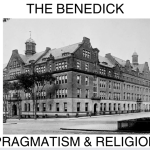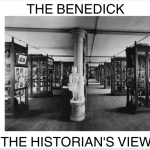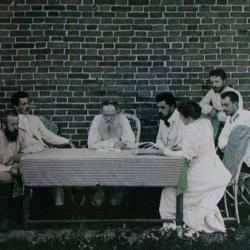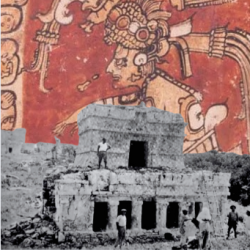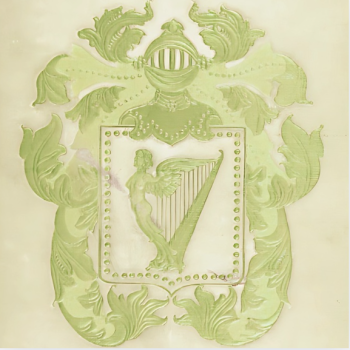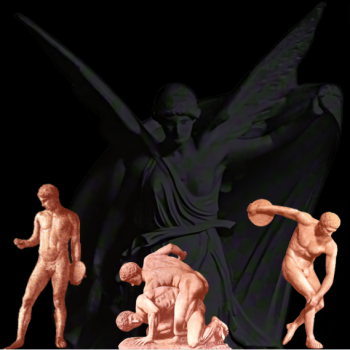MYSTICISM AND FAITH.
February 20, 1907.
February marks the first appearance of Max Eastman in the Talks. Calkins, who was presenting at The Society For Experimental Biology on February 20, 1907, could not attend. Crampton began his series of eight addresses, the Hewitt Lecturesof Columbia University at Cooper Union, which spanned February and March, 1907.
As William James mentioned in his letter to Henry James, he attended a dinner with Twain before leaving New York: “Mark Twain…poor man, is only good for monologue in his old age, or for dialogue at best, but he’s a dear little genius all the same.”In this Talk emphasis is placed on the “New Thought” movement, likely inspired by the release of Twain’s Christian Science, which Johnston reviewed for The North American Review: “Mark Twain will never forgive me,” Johnston writes, “if I do not make it clear that his book is much more than a garland of humor. In reality it is much more. It is a sober, dispassionate and very earnest study of a remarkable system, the achievement of a very gifted woman.”
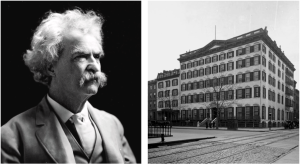
(Left.) Mark Twain in 1907. (Right.) Brevoort Hotel with Twain’s house to its right
Twain was something of a fixture in Washington Square, and once resided at 14 W. Tenth Street, just across from Percy Grant, with whom he would later collaborate with to create a children’s theater. Twain now lived at 21 Fifth Avenue, just up the street from The Benedick, and was often seen walking along Washington Square on evening “cat hunts.” In that day every affluent New Yorker kept one or two Maltese cats lying on their doorstep; whenever Twain found one, he would stop and “talk some kind of cat to them.” At the time Twain was dictating his memoir in his home, located next door to the Brevoort Hotel, where the Theosophical Conventions were held in New York, and where Charles Johnston lived for several years.
⸻
“I am sorry to say that neither Robinson nor Monty can be with us tonight,” said Mitchell, “and, indeed, I have small hope of seeing Calkins. For, though he promised to come if he could, I know he is presenting a paper before the Society for Experimental Biology, and I fear there is little chance of his being let off in time to join us. Therefore, we had best wait no longer.
“You remember that, at our last meeting, Monty defined religion as a commingled sense of dependence and reverence directed toward that which had both power and worth. This he supported by an appeal to introspection, as well as by an examination of historic systems. It appeared that the evolution of religion had been away from the sense of power, while the sense of worth had augmented, so that in certain quarters today religion was identified with poetry and considered purely a question of ideals. This led to a good deal of discussion of the reality and power of the ideal—its independence of us and its power over us. The opinion was expressed that man found the power of his religion in that department of life where his own existence was centered. As in his evolution the center of his life had passed from the physical to the mental and emotional worlds, so had his religion become more subjective, more a matter of the inner life than the outer; but it was none the less real, none the less powerful, and none the less a universal fact in the latter case than in the former. In the course of this discussion Miller ably defended the existence of inspiration as a fact of experience, and of a power, not ourselves, which makes for righteousness. I have asked him to open our discussion for us this evening.”
“Henry truly asked me to give you a lead,” said Miller, “but he did not tell me upon what to speak. As I have been privileged to attend but one other meeting I find myself in something of a quandary. There are four subjects, into any one of which I might plunge. Which I shall choose, I leave to you—for you can judge which fits best with your previous discussions. These are: first, ‘The Nature of the Religious Sentiment’; second, ‘The Problem of Evil’—to which Monty referred last time—that is, the fact so baffling to any one who would worship the supreme power in the universe that to it is due pain, and sin, and hideousness quite as truly as good. The third subject is ‘Mysticism’; and the fourth is ‘The Place of the Church in this Age.’”
“They all four fit in admirably,” said Mitchell. “The central purpose of all these meetings is to arrive at some clearer idea of the nature of the religious sentiment. The apparent evil in the world is a difficulty which has constantly been voiced, notably by Monty, and, though mysticism itself has received no direct discussion, the mystic point of view is one that has very frequently been adopted, and I know appeals strongly to more than one of us. Your fourth subject, the function of the Church in the present age, has also been touched upon. Indeed, it was a discussion of this which led to the wider inquiries we have since pursued. It is, therefore, plain that you cannot choose one, and reject the other three; for whichever you selected you would leave unsaid the greater part of what we wish to hear. Obviously, you must speak to us upon all four.”
“Any one of them is an ambitious undertaking for a single evening,” said Miller.
“The night is young,” replied Mitchell.
“Well, as you will. There is a certain unity among the four, and it may be of interest to present them in sequence. If I am asked what is the nature of the religious sentiment, my answer would turn on the words Spirit and Faith. Faith is a need of the spirit. ‘The Spirit’ and ‘Spiritual’ are terms constantly used, but we should, most of us, be puzzled to say exactly what they mean. I shall not attempt to give a complete definition, but should like to begin with those facts of human nature which form the basis or rudiments of what we call Spirit.
“Unlike the brutes, a man thinks and feels when he does not have to. To use the language we have all learned by heart, we live by responding to our environment. The brute responds to the particular exigency of the environment, its particular action upon him, and then he is, as it were, released until the next call comes. The dog is hungry and searches for food. But when he has eaten he curls himself up and sleeps, forgetful of his past hunger, of all his past activity. The brute’s actions are complete in themselves. There is no aftermath. Of course there are instincts that act persistently, making birds migrate, and the like, but at least we may say that the animal’s emotional nature responds to particular calls and then relapses into a neutral and colorless state.
“It is man in whose nature chords of feeling are struck that continue to sound when the environment speaks to him no longer. So subtle and enduring are our moods that they continue beyond our memory of their origin. Indeed, we sometimes stop and ask ourselves, Why is it that I am depressed? What is the thought or sight that cast me down or that elated me? Not infrequently when we have found it it is quite trivial, out of all proportion to the effect which it produced, so insignificant that it is set aside as soon as recognized. Yet the mood has endured. Human nature has an extraordinary susceptibility to these prolonged reverberations of feeling.
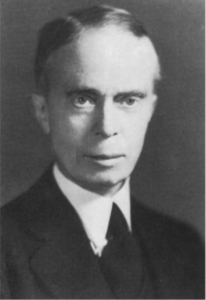
Dickinson S. Miller.
“Now this is what creates the need for religion. A man can see, or the hemispheres of his brain enable him to imagine, wide stretches of environment, destined, it may be, to affect him in the future, filled to his imagination with vague portent, but to which he does not know how to make present response. This leaves him in some degree of that disturbing uncertainty that seizes us when we feel environing forces but do not know what ‘reaction’ to make. The cause of his depression was trivial, yet he is still cast down—where can he look for comfort? The barren spaces of existence absorb his imaginings and make his loneliness known to him. Where can he find companionship? The power of nature, its vastness and impersonality, fill him with terror; where can he turn for support, where win faith and trust with which to stand against these?
“The representative faculty must solve the problem it has created. It must enable him to represent the fateful potentialities, of which for the first time he has become aware, in such form that he can at once react appropriately to them and not be left wholly at a loss. If we never had time to muse, religion would not arise. If we never had time to look about us, to grow conscious of our weakness in the presence of complex circumstance and doubtful futurity, we should never want to know the character, the spirit of those forces and futures, that we might propitiate, or trust, or rejoice in them. In other words, the imagination must condense or epitomize in one object all the thousand and one facts of life and the world; it must conceive a government of these facts, so that the spirit can thereafter treat with the government and so save itself from the desolate perplexity of having to deal in imagination and feeling with the myriad facts themselves. It must synthesize the larger environment which looms so portentously in man’s consciousness, yet of which the brute seems unaware.
“When we have such a unified object of the religious sense, we have something to which we can, as it were, ‘react.’ Now if we discover that in the nature of things there is such a central fact which the spirit may confront, then this is a world in which the religious need is met. To this we can take our joy and our sorrow. In this we can place our faith, and find in this synthesizing representative power the basis for a trust which will still the reverberations of our fears.
“This brings me to my second topic. The trouble is that the government of the world seems not wholly beneficent. Evil flows from it as well as good. The thought that good and evil are indifferent to this central power is intolerable to the religious sense. Nor will our need admit a power greater than that in which we trust, capable of overruling its decrees, thwarting its will. Our faith must be justified, our trust complete.
“I need not enter here upon a prolonged discussion of the ancient problem of evil. It is enough to say that even from a naturalistic point of view, making no doubtful assumptions in metaphysics or in history, we can answer the problem so far as the religious sense presses for an answer. Good flows from the nature of things, and evil flows from the nature of things; but what it concerns us to note is that superiority flows from the nature of things;—the fact that the good is better than the evil. The nature of things fixes both human need and the conditions of its fulfillment, and so decrees the moral law and paints the ideal. Our natures flow from the nature of things. So Goethe was right in saying that virtue proceeded from the heart of nature. And so it is fitting that in the tragedy of Aeschylus that which is known as Earth has also the name of Righteousness. The ideal itself is a product of the universe, as is the heart of man and all that yearns and aspires therein. To follow nature is to assert our own.
“Therefore we can rest in this: that though both good and evil are present in the universe, the universe is not indifferent to them; that the good is better than the evil is also in the universe, a force making for righteousness. I said that the essentials for a religion were Spirit and Faith. Faith is simply trust, trust in the supreme power, trust in the central fact. Now the mystical mood of mind is simply faith or trust in its utter completeness. Mysticism is essentially a moral and spiritual phenomenon. We are no longer perplexed or made desolate by the need of responding in spirit to the thousand-fold intricate and dubious facts of the inner world. We have seen the guiding thread, recognized the law, conformed to the Governance. The One delivers us from the many. To the One, in scientific parlance, the spirit can ‘react.’ That reaction is the self-abandonment of mysticism, the union with that which is supreme. All religion is a quest for the One in the many. Therefore the mystic attitude is the consummation of religion.
“This consummation is wrought in the human spirit by Faith and by Love. In the early stages of religious feeling man turns to the supreme for the benefits he can receive; as a dog turns to his master for food or for safety. Later this attitude changes. The thought of self lessens. We seek this central power of life not with the hope of the benefactions that flow therefrom, but as we seek one we love, for companionship and for itself. We learn first to depend, then to reverence, and then to love. With love comes the desire for union, and from the desire is born the fact and the experience—the mystic union with the core of things. I would be very glad to hear what you think of these views.”
“But you have not yet spoken on your fourth topic,” said Mitchell, “will you not continue?”
“This was to be an evening of talk, not of monologue,” replied Miller. “I think you must let me postpone my remaining subject.”
“If we are sure it is only a postponement, let it be as you wish,” said Mitchell. “You certainly have given us ample matter for consideration; and sometimes it is true that if we have too broad a field, discussion falters from the very richness of possibility. I am very glad, however, that we made you present these three subjects as a single sequence, for I think they tend to clarify one another. In particular it seems to me we must view the religious need in the light of its satisfaction. We frequently hear arguments, for the existence of a supreme power of good, drawn from the craving of the human heart, and I confess that these arguments in a way impress me. I suppose, for example, it could be assumed that if water had never existed, no form of life could ever have developed which would need water, and that thus the thirst is evidence of the existence of that which will satisfy it. Yet this argument from our necessities involves so many doubtful factors that it is far from conclusive. We must demonstrate that this is indeed a necessity of our being, not some dreamed-of luxury, and even when we have done this it remains to find the satisfaction we have shown needful. Therefore no reasoning from our needs, however valid, can be either so convincing or so desirable as the direct satisfaction of those needs in experience. This is what mysticism does for its followers. In the inner union with the heart of things, the satisfaction of the religious craving becomes a fact of immediate experience. So, though the craving of the heart may be the origin of religion, the experience of the mystic is its justification. Do you not think with me that, taken alone, your first argument is rather cold?”
“It is purely psychological; yes.”
“But few have the experience you tell us characterizes the mystic,” Griscom interjected.
“Until this comes have we not the need for such arguments as Mr. Miller has given? The early stage of mysticism—as of all religion—must be a matter of faith. Does not faith largely consist in trusting these cravings of the heart? In the belief that if we persist, we will experience their satisfaction?”
“We are getting down to some very fundamental thinking,” said Woodbridge, “and I am finding my own views much clearer than they were. One thing that struck me particularly is the parallel between this thesis of Miller’s, and that which Crampton gave us two meetings ago. I do not know whether it was as noticeable to the rest of you as it was to me, but I found myself thinking of it continually as Miller was talking, and that I was again compelled to agree with the scientists—whom I despise.”
“That is very interesting,” said Miller, “I wish I had heard Crampton.”
“Approaching religion from a purely biological point of view,” said Woodbridge, “his presentation was from the scientific standpoint, while yours was from that of the psychologist and the mystic. Yet the thread of the two discourses seemed to me the same; and still more marked was the similarity of the general conclusions reached: that our chief good lay in an acceptance of the universe as it is; in as close a union with its spirit and its laws as we can compass. As I said before, we find the attainment of our desires hedged around by certain restrictions, not of our own making, but inherent in life itself. Let us accept them joyfully, enthusiastically, and in obedience to them let us become one with them. Let us unite ourselves to Life. All this is clearer to me than it was, and seems more fundamental, more truly the basis of a religious attitude. But there are certain problems which it does not solve. We need either a wider basis or to build further upon what we have. For certain facts of experience, certain common phenomena of religious feeling are coordinated and organized in neither science nor ethics, nor do I see how they are correlated with the basic principles we are considering. I mean such a desire as that which we all have to play providence to those we love; to our children, to our wives, and even to our friends. We long to stand between them and life, to shield and guard them, to keep them from the rigor of these restrictions, even from the very union which we are now viewing as an ultimate satisfaction of our hearts’ craving. How are we to explain and organize such desires as these? Or again, when we have done our utmost, or when in advance we get some heart-sick perception of how impotent we are in the face of nature, of how life sweeps away the safeguards which we try to rear, and how light and permeable is the shield our love and thought at best can furnish, what a longing there is then to take all this, all our fears and premonitions, our love and our loved ones, and lay them all in the hands of God. We call upon Him to do what we can not. Yet what is it we are asking? For God to shield from God? For Life, whose heart we seek, to keep us from Itself? What is the organization of this?”
“You ask the explanation of human pain and fear—of the tragedy and pathos of love,” said Mitchell. “It would need a far wiser man than I to answer you, and yet I think the secret lies in that reproach of Jesus to his disciples, when terrified by the storm they called upon him to awake and save, ‘Oh, ye of little faith.’ Even when we have learned to trust ourselves to Fate, to see that it is in our power to gain from all that can come to us, whether of joy or sorrow, even then we fear to trust those we love to the same great current.”
“Here,” said Griscom, “you touch upon an element which I brought up before—and which it seems to me we will have sooner or later to consider in a manner more commensurate with its importance—that is, the element of faith. I believe Miller defined mysticism as faith in its utter completeness, or, perhaps, as the consciousness following this act of faith. But whatever words were used, he certainly meant that faith was a prerequisite, and I believe it to be a prerequisite in all religions. All religious teaching that I know anything about requires us to transfer the basis of our lives from dependence upon external things to dependence upon spiritual law, or upon some form of providence. Spiritual experience, the illumination of the saint, the sense of union with God to which the mystic attains, all these are the results of such a reversal of basis. And for this, faith, and great faith, is indisputably needed. Indeed, I think faith is not only the first factor in the religious life, but one which is constantly required; which, in fact, underlies all progress; for every step in advance is away from the known and into the unknown.”
“I must hold that, so far as we have any record, faith has not led to progress but to stagnation.,” said Crampton. “Progress seems rather to have resulted from the restless seeking of those who were without faith, who did not believe, and so continued their search.”
“See how even the mighty fall!” said Mitchell. “Is not this the fallacy of the undistributed middle in which we, logicians, theologians, and scientists alike are now snared? ‘There lies more faith in honest doubt, believe me, than in half the creeds.’ There is a faith in formulas, in common beliefs, in the fashions of the time; but there is something far more fundamental than these—a faith in truth, in law, in the heart and essence of life. But for his faith in truth and in law no man would seek for truth, let alone being discontented with its popular counterfeits. The greater faith prevents the lesser. But it is the greater faith that is operative in true religion, so far as religion is lived; as I believe it is in science, so far as science is the search for truth. Popular science and popular religion alike present the static adherence to an external formula, which you justly say leads to stagnation, but which is rather too mean and poor a thing to designate as faith.”
“It is your greater faith to which I refer,” said Griscom.
“But,” said Crampton, “must not science be the guide in this? I do not think we are compelled to grant your contention that faith in the existence of a solution underlies all our questioning. We may be prompted by sheer curiosity. But assuming that there always is such a faith, then I would say that it is valuable so far as it is scientific—so far, that is, as it is a faith based upon scientific observation and inference, so far as science is its guiding principle. A man on the edge of a precipice may, if he is sufficiently crazy, have the ‘faith’ that he could throw himself over in safety. It would be a rank delusion, though his faith in it might be supreme. To act upon a faith like this would be simple suicide, and in general an unguided faith is a danger both to the man holding it and to everyone in the neighborhood. The only safe guide for faith is science. Certainly the vague, hazy concepts of the mystic are no trustworthy substitute.”
“There,” said Mitchell, “I agree with you only in part. I grant you that faith must be guided. Indeed, I suspect, in order properly to be called faith, it must both be guided by experience and rooted therein. But there is no particular reason why this experience should be in the history of the body rather than of the spirit. Just so far as science confines itself to the physical world its usefulness as a guide is limited to things physical. It is, as it were, the common organized experience of things physical, and, unless our individual experience is deeper than that of mankind at large, we would be very foolish to disregard this guide in the world where it operates—in the world of precipices and falling bodies, and shock of contact.
“But the experiences of the spirit modern science has not organized. So in the inner world physical science can help us only by correspondence and analogy. The guide to our faith must be direct experience, either of our own or of those who have entered there before us. And this is mysticism. Mysticism is the philosophy of direct experience—immediate, individual, and incommunicable, save through experience. I quite agree with you that the ‘concepts’ of the mystic are frequently vague and distorted. They are only the mental interpretation of something which is beyond the mind; the shadows thrown on the screen of the brain by the soul in the Light of the Heavens. But the experience itself is not vague, nor is the faith it inculcates wandering and undirected. Let us remember also that science is only useful as it guides us to experience. The experience itself is what is of value, both in the outer and in the inner worlds. The description of that experience is of very secondary moment.”
“I am unconvinced, I think, with Woodbridge, that there is a certain parallel between the biological view of ethics, which I tried to present, and this which Miller has given us tonight,” said Crampton. “But, frankly, that parallel confirms me in the opinion that the former is adequate; that there is no need to talk about mysticism; that all that is of value here is science, or capable of explanation in scientific terms rather than in the vague nomenclature of mysticism and religion.”
“No,” said Miller, “I could never agree to that. Science can never fulfill the function of religion. Its terms and methods can never replace those of mysticism. They are opposite poles. Their ends are totally distinct. Science is always analytical, always dissecting; as a botanist pulls a rose to pieces to examine its petals and stamens under his microscope, and in the process the subtle beauty which kindles us is lost. I remember an aphorism of a friend of mine which is apposite here. He said: ‘Mechanics is the science of force, with the Force left out; Biology is the science of life, with the Life left out; Ethics is the science of morality, with the Morale left out.’ Religion, on the other hand, cares little for explanation, but is always kindling; always seeking and cherishing, in what it meets, that inner quickening spark which can kindle our hearts. The difference is well illustrated in two men: Carlyle and John Stuart Mill; Mill, a painstaking, conscientious, thorough analyst, longing to be kindled, loving a woman who could kindle him, and admiring Carlyle for his vivifying power, but withal himself ‘dry as dust’; Carlyle dramatic, living, kindling the imagination and the heart, but despising Mill’s analytic power which he, Carlyle, had not.”
“The mystic sees with the closed eye; the scientist with the open,” Grant suggested. “Science and analysis are constantly enriching the facts upon which the inner eye will now or later look. Religion means more to us the more we learn, and I believe we in the Church should be very grateful to you men of science who have so broadened and clarified our outlook.”
“Surely,” said Mitchell, “both are necessary. I certainly would be the last to advocate either outer or inner blindness. I want the whole of life; vision wherever vision is possible, consciousness and experience on every plane of my being. Religion does not mean to me something which takes me away from life, but something which, as Woodbridge put it, unites me thereto, embracing and making its own all that is best, all that is quickening, wherever found. But we have heard nothing from Charley all the evening, and I know he has ideas in plenty on this point.”
“Let my contribution be the request to Miller to speak on his fourth topic,” said Johnston, “the position or function of the Church today. It should be very pertinent to what Percy was saying of the relation of the Church to science.”
“You must really let me off from that this evening,” said Miller. “The topic is too ambitious and immense. The place of the Church can not be settled at this eleventh hour—or somewhat later, as I fear it now is. Let me, instead, buttress myself with Cardinal Newman and read to you an extract from his essays in the ‘Development Of Christian Doctrine,’ to which I referred last time. It bears more or less upon the theme Henry has just advanced, the divine hospitality of religion, and particularly of Christianity. Here it is, the phenomenon admitted on all hands is this: That great portion of what is generally received as Christian truth is, in its rudiments or in its separate parts, to be found in heathen philosophies and religions. For instance, the doctrine of a Trinity is found both in the East and in the West; so is the ceremony of washing; so is the rite of sacrifice. The doctrine of the Divine Word is Platonic; the doctrine of the Incarnation is Indian; of a divine kingdom is Judaic; of Angels and demons is Magian; the connection of sin with the body is Gnostic; celibacy is known to Bonze and Talapoin; a sacerdotal order is Egyptian; the idea of a new birth is Chinese and Eleusinian; belief in sacramental virtue is Pythagorean; and honors to the dead are a polytheism. Such is the general nature of the fact before us; Mr. Milman argues from it—‘These things are in heathenism, therefore they are not Christian.’ We, on the contrary, prefer to say—‘These things are in Christianity, therefore they are not heathen.’ That is, we prefer to say, and we think that Scripture bears us out in saying, that from the beginning the Moral Governor of the world has scattered the seeds of truth far and wide over its extent; that these have variously taken root, and grown up as in the wilderness, wild plants, indeed, but living; and hence that, as the inferior animals have tokens of an immaterial principle in them, yet have not souls, so the philosophies and religions of men have their life in certain true ideas, though they are not directly divine. What man is amid the brute creation, such is the Church among the schools of the world; and as Adam gave names to the animals about him, so has the Church from the first looked round upon the earth, noting and visiting the doctrines she found there. She began in Chaldea, and then sojourned among the Canaanites, and went down into Egypt, and thence passed into Arabia, till she rested in her own land. Next she encountered the merchants of Tyre, and the wisdom of the East country, and the luxury of Sheba. Then she was carried away to Babylon, and wandered to the schools of Greece. And wherever she went, in trouble or in triumph, still she was a living spirit, the mind and voice of the Most High; ‘sitting in the midst of the doctors, both hearing them and asking them questions’; claiming to herself what they said rightly, correcting their errors, supplying their defects, completing their beginnings, expanding their surmises, and thus gradually by means of them enlarging the range and refining the sense of her own teaching. So far then from her being of doubtful credit because it resembles foreign theologies, we even hold that one special way in which Providence has imparted divine knowledge to us has been by enabling her to draw and collect it together out of the world, and, in this sense as in others, ‘to suck the milk of the Gentiles and to suck the breast of kings.’
“How far in fact this process has gone is a question of history; and we believe it has before now been grossly exaggerated and misrepresented by those who, like Mr. Milman, have thought that its existence told against Catholic doctrine; but so little antecedent difficulty have we in the matter, that we could readily grant, unless it were a question of fact not of theory, that Balaam was an Eastern sage, or a Sibyl was inspired, or Solomon learnt of the sons of Mahol, or Moses was a scholar of the Egyptian hierophants. We are not distressed to be told that the doctrine of the angelic host came from Babylon, while we know that they did sing at the Nativity; nor that the vision of a Mediator is in Philo, if in very deed He died for us on Calvary. Nor are we afraid to allow that even after His coming the Church has been a treasure-house, giving forth things old and new, casting the gold of fresh tributaries into her refiner’s fire, or stamping upon her own, as time required it, a deeper impress of her Master’s image. The distinction between these two theories is broad and obvious. The advocates of the one imply that Revelation was a single, entire, solitary act, or nearly so, introducing a certain message; whereas we, who maintain the other, consider that Divine teaching has been in fact what the analogy of nature would lead us to expect, ‘at sundry times and in divers manners,’ various, complex, progressive, and supplemental of itself. We consider the Christian doctrine, when analyzed, to appear, like the human frame, ‘fearfully and wonderfully made’; but they think it some one tenet or certain principles given out at one time in their fullness, without gradual enlargement before Christ’s coming or elucidation afterwards. They cast off all that they also find in Pharisees or heathen; we conceive that the Church, like Aaron’s rod, devours the serpents of the magicians. They are ever hunting for a fabulous primitive simplicity; we repose in Catholic fulness. They seek what never has been found; we accept and use what even they acknowledge to be a substance.
“This assimilative power of the Church, exercised upon the products of human thought in all their fullness and variety, is the natural prerogative of the Christian spirit. The Christian stress on sympathy should be interpreted as including intellectual sympathy—imaginative sympathy. Just as Christ came to men ‘that they might have life and that they might have it more abundantly,’ so the Church should come to them at the present day.”
“You have voiced my own ideal of what a Church should be,” said Mitchell, “not insisting upon any language of its own, but speaking the tongue of those whom it addresses; not waiting for others to come to it, but in sympathy and brotherhood going out to them; not to convert, but to aid and to quicken—that there may be more light. I was not familiar with that passage from Newman and it is of the greatest interest to me, for it puts forward an ideal which, as a member of the Theosophical Society, I have long held, but which one finds too seldom in the churches. I mean the universality of religious inspiration; that truth is to be found in all religions; the deepest truths in their common part. To find this common part, both in historic systems of religion, and in the individual aspiration of those around us, has been the object of the Theosophical Society’s activities for many years. Naturally, therefore, your quotation interests me much, both on account of its content and its source. If I may be permitted, however, I would like to return to another point you made in your description of mysticism. You spoke of our turning to the Spirit, first for the favors it could confer, for some material benefit or protection, but that later we learned a more selfless love, and sought union and companionship with the heart of life because of love rather than because of fear. The first of these two attitudes seems to me exactly illustrated in Christian Science, and in much of the so-called ‘New Thought,’ where health, happiness, and even success in business, are held out, not alone as rewards, but as primary inducements to religion. I would like to know whether you agree with me that these movements are typical of the most rudimentary religious instinct; in short, like a marriage solely for money, little above the prostitution of what is sacred to what is very low.”
“No,” Miller said, “I do not agree with you at all. These movements contain elements that we can not afford to dispense with. As you yourself said, one’s religion should unite one to life, make every part of existence better and sweeter, above all, cleaner and more healthful. The care of the body is worthy and by no means to be neglected. There is good scriptural testimony to the fact that the body is the temple of the Holy Ghost, and that the temple is to be kept worthy and reverenced. The ideal of beauty and symmetry of development, in the body as in the mind and spirit, is that which the world owes to the culture of the Greeks; and it is one of the things toward which I think Christianity should be hospitable—should add to the long roll of sifted good in the treasure of her teaching.”
“Hear! hear!” said Grant.
“Since you won’t agree with me,” said Mitchell, “I shall have to agree with you. Mens sana in corpore sano is to be aimed for by us all, and symmetry of development is infinitely to be desired. Nevertheless, do not let us seek to coin the Spirit into dollars, nor turn aspiration and prayer into fat. With your type of Christian Science I fancy I have no quarrel, but with the usual kind I have. I think with you there is deep truth in the promise of Jesus: ‘Seek ye first the kingdom of God, and his righteousness; and all these things shall be added unto you.’ But the kingdom of God was to be first. It is the reversal of emphasis which I object to in Christian Science.”
“But is it more than an appeal from a false self to a true one?” asked Miller. “We know that the real ‘I’ is not ill, only this thing we wrongly call ourselves. Just as in speech we are sometimes, let us say, guilty of some rudeness or absurdity, and then suddenly check ourselves with the remark, ‘Oh, I beg your pardon! I did not mean that. That is not at all my real opinion,’ thus appealing from a false self to a real one, so I think the Christian Scientist checks himself when falling into a like absurdity.”
“Note, however, that here we appeal to the better self to do the will of the better self,” said Mitchell, “not to do the will of the lower self. We do not deny the absurdity; on the contrary, we recognize it fully and seek to detach ourselves therefrom and to correct its cause.”
“That is true,” agreed Miller.
“That,” Mitchell continued, “is my twofold objection to Christian Science; first, that it falsifies the facts, and second, that its prayer is, ‘my will not Thine be done.’ Which one of us has not experienced the spiritual growth that comes from hardship, deprivation, struggle, and pain? And yet we continually treat these things as evils, and the instant they confront us we cringe and cower. The Christian Scientist invokes the soul to save his body, careless of the need of the soul, careless of the integrity of his fate.”
“I wish,” said Grant, “that idea of symmetry of development and the religious value of beauty and force could receive more attention in the Church. This old notion that you must starve the body to be religious is utterly misleading. Your bodily vigor is one of your talents. One of the things you must make the most of, put out at usury, and bring both principal and interest to the service of God. Is it a trouble to have too much physical energy? Does your vitality tend to run away with you? That is no reason why you should throw it away. Everything that is worth while, that has power and force and can work, has to be mastered and controlled. But it is none the less necessary to use it and to make it as strong and efficient as we can. But how infinitely broader and freer our concept of Christianity is today than it used to be! I remember the old slur that used to be brought against us of a narrow Christianity, a narrow, one-sided view of life. But now how much better we see! How we recognize that there is nothing good foreign to the message of Jesus; that all the accumulated spiritual treasures of the world are truly our heritage; that there is no corner or cranny of life that cannot give to Christianity some new gem, and into which Christianity does not shed some new and beautifying light! Contrast the broad Christianity of today with the narrow theology of ‘Robert Elsmere.’”
“I quite agree with you, Percy, that genuine Christianity should be the teaching of the life of the soul,” said Griscom, “and that nothing foreign to the soul of man could be foreign to Christianity. Would it not be interesting in this connection to examine again the question of what are the essentials of Christianity? What is it that gives it its light and its power? As we look back upon the narrow Christianity of which you speak, and back of that upon the history of the Church through all the Middle Ages, there seems very little in the organization that is capable of illumination; or that could touch the soul in any way, unless it be with horror. And yet something of the kind must have been there. The flame must have been carried down unextinguished. I believe if we were really to study it, we could trace an unbroken descent, a spiritual heritage throughout the centuries, the history of the ‘Church Invisible,’ the history of the Illuminati. What little reading I have been able to do has confirmed me in this opinion.
“But look at the time! I must be off.”
Exordium: Conscientious Clergyman.
Chapter I. The Nature of the Inquiry.
Chapter II. Christianity and Nature.
Chapter III. Evolution And Ethics.
Chapter IV. Power, Worth, and Reality.
Chapter V. Pragmatism and Religion.
Chapter VI. Mysticism and Faith.
Chapter VII. The Historian’s View.
Chapter VIII.Organization and Religion.
Chapter IX. The Theosophical Movement.
Chapter X. Signs of the Times.
Chapter XI. Has the Church Failed?
Chapter XII. Silence.
CITATIONS:
“Will Fight Mrs. Tingley.” The Sun. (New York, New York) November 9, 1902.
“New York, Southern District, U.S District Court Naturalization Records, 1824-1946,” database with images, FamilySearch (https://www.familysearch.org/ark:/61903/1:1:QP76-18JM : 8 March 2021), Charles Johnston, 1903.
Johnston, Charles. “Mark Twain and Christian Science.” The North American Review. Vol. CLXXXIV, No. 611 (March 15, 1907): 641-645.
“At Educational Alliance.” The Brooklyn Daily Eagle. (Brooklyn, New York) November 20, 1907.
“Twain Heads Theatre.” The New York Times. (New York, New York) June 12, 1908.
“End Of Children’s Theatre.” The New York Times. (New York, New York) August 10, 1909.
Twain, Mark; Paine, Albert Bigelow (ed.) Mark Twain’s Letters: Volume 2. Harper & Brothers. New York, New York. (1917): 794-795.
“H.W. Fisher Addresses Chamber.” The Orlando Evening Star. (Orlando, Florida) November 10, 1925.
Miller, Dickinson S., Loyd D. Easton, and Lloyd D. Easton. Introduction. In Philosophical Analysis and Human Welfare: Selected Essays and Chapters from Six Decades. D. Reidel Publishing Company. Dordrecht, NL. (1975): 13.
Twain, Mark; John Cooley (ed.) Mark Twain’s Aquarium: The Samuel Clemens-Angelfish Correspondence, 1905-1910. University Of Georgia Press. Athens, Georgia. (1991): 240-241.
Barron, James. “City Room; For a Church, A Sound That Can Only Be Imported.” The New York Times. (New York, New York) October 25, 2010.Twain, Mark; Griffin, Benjamin; Smith,
Harriet Elinor (eds.) The Autobiography Of Mark Twain Vol. II. University Of California Press. Berkeley, California. (2013): 564.
Higgins, Shawn F. “The Benedick: An Analysis of Talks on Religion.” Dewey Studies. Vol. VI, No. 2. (2022): 16-75.


